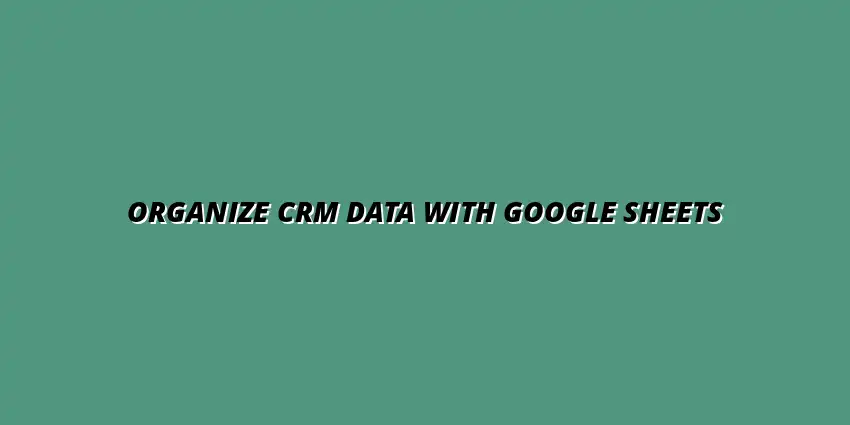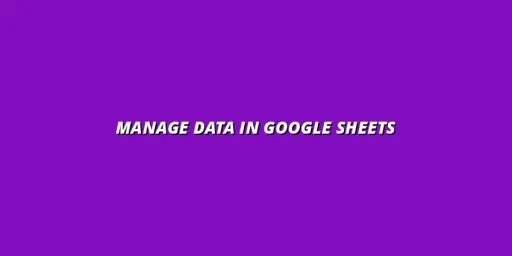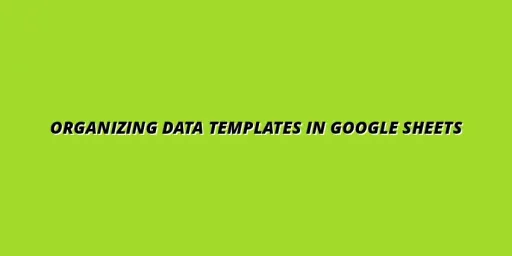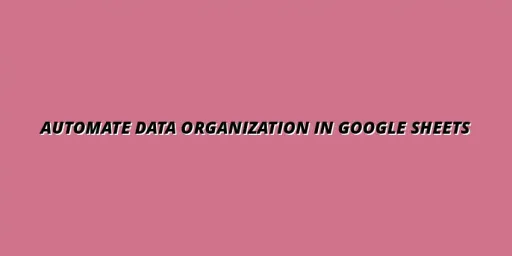Manage Data in Google Sheets
By Aria Kwan / Jan 30
When it comes to customer relationship management (CRM), having organized data is essential. Businesses need to track customer interactions, sales leads, and other critical information. This is where tools like Google Sheets come into play, offering an easily accessible platform for managing data effectively.
By utilizing Google Sheets, teams can ensure that information is not only organized but also readily available for analysis and decision-making. Whether you're a small business or a larger organization, having your CRM data in one place simplifies operations and enhances productivity. To streamline your data organization, check out these tips on streamlining data organization in Google Sheets.
Understanding the needs of CRM data management is the first step toward successful organization. Businesses require a system that can handle diverse data types, including customer contact information, transaction histories, and customer preferences. This data forms the backbone of relationship-building efforts and sales strategies.
Moreover, the ability to easily visualize and analyze this data helps teams identify trends and make informed decisions. By organizing data in a way that is easy to interpret, companies can respond to customer needs more effectively. Learn how to manage customer data effectively with Google Sheets for better insights.
Efficient data organization is crucial for any CRM system because it allows for quick access to information. When data is structured well, teams can easily find what they're looking for without wasting time. This leads to better customer service and more personalized interactions.
Additionally, organized data supports better reporting and analytics. It makes it easier to generate insights that can drive sales and marketing strategies. In short, efficient organization helps businesses operate smoothly and stay competitive. Automating your reporting can significantly improve efficiency; explore how to automate reporting with Google Sheets.
While data organization is vital, many businesses face challenges in managing their CRM data effectively. Some common challenges include data duplication, inconsistent formats, and difficulties in collaboration among team members. These issues can lead to confusion and missed opportunities.
Addressing these challenges with a structured approach in Google Sheets can help streamline CRM data management. By setting up clear guidelines and utilizing the features of Google Sheets, teams can overcome these obstacles effectively.
Google Sheets is a popular choice for CRM data organization due to its cost-effectiveness and accessibility. As a cloud-based tool, it eliminates the need for expensive software licenses while still providing robust functionality. This makes it an attractive option for businesses of all sizes.
Moreover, because Google Sheets is web-based, team members can access the data from anywhere, making it highly convenient for remote or distributed teams. This flexibility allows for better collaboration and real-time updates. Discover how to automate your CRM with Google Sheets for increased efficiency.
One of the main advantages of Google Sheets is its low cost. Most businesses can utilize it for free with a basic Google account, while premium features are available at a minimal cost. This allows companies to allocate their budgets towards other essential areas.
The combination of affordability and accessibility makes Google Sheets a go-to tool for many organizations looking to manage their CRM data efficiently.
Google Sheets excels in providing collaboration features that foster teamwork. Multiple users can work on the same document simultaneously, which means changes are updated in real-time. This enhances communication and ensures everyone stays on the same page.
In addition to real-time editing, features like comments and chat allow team members to discuss data without leaving the platform. This means less time spent on email chains and more focus on proactive collaboration. For managing large datasets effectively, see our guide on managing large datasets in Google Sheets.
These collaborative features significantly improve the efficiency of managing CRM data, making it easier for teams to achieve their goals.
When it comes to managing customer relationships effectively, Google Sheets can be easily enhanced through the use of add-ons. These add-ons provide additional tools and features that can transform a simple spreadsheet into a powerful CRM platform. By exploring the right add-ons, you can significantly elevate your CRM data management experience. Check out these Google Sheets CRM workflow templates to get started.
One major advantage of using Google Sheets is the ability to integrate various third-party tools that can help with data insights and reporting. This integration not only expands the functionalities of your spreadsheet but also allows for a more cohesive workflow within your team. Learn to automate data visualization with Apps Script for improved insights.
Using the right add-ons can make a huge difference in how you manage your CRM data. Here are some must-have add-ons you should consider:
These add-ons not only streamline your process but also improve team collaboration. They allow you to work together in real time, ensuring everyone is on the same page.
Integrating third-party tools into Google Sheets can provide you with deeper insights into your CRM data. Here are some options:
These tools can help you make smarter decisions based on data-driven insights, ultimately improving your CRM strategy.
Google Apps Script is a powerful tool that allows you to automate tasks within Google Sheets. You can use it to create custom functions and automate repetitive tasks, making your CRM management easier. Here are some examples:
By leveraging these features, you can save time and focus more on building strong relationships with your customers.
As you enhance your CRM using Google Sheets, maintaining data integrity becomes crucial. With so much information at your fingertips, it’s essential to implement strategies that keep your data accurate and reliable. Following best practices can help in this area.
When different users are inputting data, it’s easy for mistakes to happen. That’s why having a solid plan for tracking changes and managing access is so important!
Version control allows you to keep track of all changes made to your Google Sheets. Here’s how you can effectively implement it:
By maintaining clear records of changes, you can avoid confusion and ensure that your data remains reliable.
Data security is essential, especially when handling sensitive customer information. Google Sheets allows you to set specific permissions, so you can control who has access to your data. Here are some steps to manage permissions effectively:
By managing permissions correctly, you can protect your data and maintain the integrity of your CRM system.
As I explore the use of Google Sheets for CRM, I often get questions about its suitability for various business needs. It's important to clear up any doubts and provide clarity on how Google Sheets can meet expectations.
Understanding its capabilities and limitations can help you make an informed decision on whether it is the right tool for your CRM management.
If you're considering Google Sheets for extensive CRM operations, you'll want to evaluate its limits and performance. While it can handle a substantial amount of data, there are some factors to consider.
For example, if your business has a complex CRM structure or a massive database, you might encounter performance issues. However, it can still be an effective tool for many businesses!
When thinking about using Google Sheets for larger CRM needs, keep these points in mind:
Understanding these limitations can help you decide if Google Sheets is the best fit for your CRM needs.
Another common question is how Google Sheets stacks up against dedicated CRM software. While both can be used to manage customer relationships, they have their unique strengths.
It's essential to assess what you need from a CRM tool to determine the best option for your business!
Here’s a quick comparison between Google Sheets and dedicated CRM tools:
| Feature | Google Sheets | Dedicated CRM Tools |
|---|---|---|
| Cost | Free/Low Cost | Varies, often higher |
| Customization | Highly customizable | Customizable but may be limited |
| Analysis Tools | Basic functions available | Advanced analytics and reporting |
| Collaboration | Real-time collaboration | Collaboration features vary |
Ultimately, your choice depends on your specific business needs and how much you're willing to invest in CRM management.
In summary, Google Sheets can be an effective and flexible tool for CRM data organization. Its cost-effectiveness and user-friendly features make it accessible to businesses of all sizes. However, it’s crucial to weigh its strengths against your specific needs.
By enhancing your CRM system with the right tools, you can streamline your processes and improve customer satisfaction!
Reflecting on the flexibility and adaptability of Google Sheets, I find it offers numerous advantages:
With these benefits in mind, it’s clear that Google Sheets can be a powerful asset in your CRM toolkit!
If you're ready to implement Google Sheets for your CRM, here are some resources to help you get started:
Now is the perfect time to take action and enhance your customer relationship management strategy!

 Manage Data in Google Sheets
Understanding Real-Time Data Management in Google Sheets
In today's fast-paced business world, manag
Manage Data in Google Sheets
Understanding Real-Time Data Management in Google Sheets
In today's fast-paced business world, manag
 Organizing Data Templates in Google Sheets
Understanding the Importance of Organized Data Templates in Google Sheets
In today's fast-paced worl
Organizing Data Templates in Google Sheets
Understanding the Importance of Organized Data Templates in Google Sheets
In today's fast-paced worl
 Automate Data Organization in Google Sheets
Understanding the Importance of Data Organization in Google Sheets
In today's data-driven world, org
Automate Data Organization in Google Sheets
Understanding the Importance of Data Organization in Google Sheets
In today's data-driven world, org